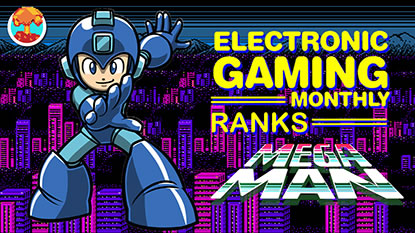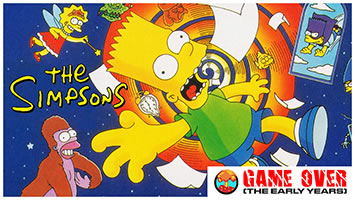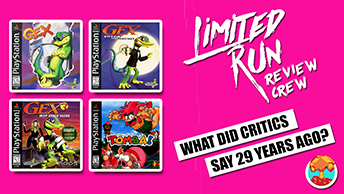- CLASSIC MAGAZINES
- REVIEW CREW
A show recapping what critics thought back
when classic games first came out! - NEXT GENERATION'S BEST & WORST
From the worst 1-star reviews to the best
5-stars can offer, this is Next Generation! - NINTENDO POWER (ARCHIVE)
Experience a variety of shows looking at the
often baffling history of Nintendo Power! - MAGAZINE RETROSPECTIVE
We're looking at the absolutely true history of
some of the most iconic game magazines ever! - SUPER PLAY'S TOP 600
The longest and most ambitious Super NES
countdown on the internet! - THEY SAID WHAT?
Debunking predictions and gossip found
in classic video game magazines! - NEXT GENERATION UNCOVERED
Cyril is back in this spin-off series, featuring the
cover critic review the art of Next Generation! - HARDCORE GAMER MAGAZING (PDF ISSUES)
Download all 36 issues of Hardcore Gamer
Magazine and relive the fun in PDF form!
- REVIEW CREW
- ELECTRONIC GAMING MONTHLY
- ELECTRONIC GAMING MONTHLY RANKS
From Mario to Sonic to Street Fighter, EGM
ranks classic game franchises and consoles! - ELECTRONIC GAMING MONTHLY BEST & WORST
Counting down EGM’s best and worst reviews
going year by year, from 1989 – 2009! - ELECTRONIC GAMING BEST & WORST AWARDS
11-part video series chronicling the ups and
downs of EGM’s Best & Worst Awards!
- ELECTRONIC GAMING MONTHLY RANKS
- GAME HISTORY
- GAME OVER: STORY BREAKDOWNS
Long-running series breaking down game
stories and analyzing their endings! - A BRIEF HISTORY OF GAMING w/ [NAME HERE]
Real history presented in a fun and pithy
format from a variety of game historians! - THE BLACK SHEEP
A series looking back at the black sheep
entries in popular game franchises! - INSTANT EXPERT
Everything you could possibly want to know
about a wide variety of gaming topics! - FREEZE FRAME
When something familiar happens in the games
industry, we're there to take a picture! - I'VE GOT YOUR NUMBER
Learn real video game history through a series
of number-themed episodes, starting at zero! - GREAT MOMENTS IN BAD ACTING
A joyous celebration of some of gaming's
absolute worst voice acting!
- GAME OVER: STORY BREAKDOWNS
- POPULAR SHOWS
- DG NEWS w/ LORNE RISELEY
Newsman Lorne Riseley hosts a regular
series looking at the hottest gaming news! - REVIEW REWIND
Cyril replays a game he reviewed 10+ years
ago to see if he got it right or wrong! - ON-RUNNING FEUDS
Defunct Games' longest-running show, with
editorials, observations and other fun oddities! - DEFUNCT GAMES QUIZ (ARCHIVE)
From online quizzes to game shows, we're
putting your video game knowledge to the test!- QUIZ: ONLINE PASS
Take a weekly quiz to see how well you know
the news and current gaming events! - QUIZ: KNOW THE GAME
One-on-one quiz show where contestants
find out if they actually know classic games! - QUIZ: THE LEADERBOARD
Can you guess the game based on the classic
review? Find out with The Leaderboard!
- QUIZ: ONLINE PASS
- DEFUNCT GAMES VS.
Cyril and the Defunct Games staff isn't afraid
to choose their favorite games and more! - CYRIL READS WORLDS OF POWER
Defunct Games recreates classic game
novelizations through the audio book format!
- DG NEWS w/ LORNE RISELEY
- COMEDY
- GAME EXPECTANCY
How long will your favorite hero live? We crunch
the numbers in this series about dying! - VIDEO GAME ADVICE
Famous game characters answer real personal
advice questions with a humorous slant! - FAKE GAMES: GUERILLA SCRAPBOOK
A long-running series about fake games and
the people who love them (covers included)! - WORST GAME EVER
A contest that attempts to create the worst
video game ever made, complete with covers! - LEVEL 1 STORIES
Literature based on the first stages of some
of your favorite classic video games! - THE COVER CRITIC
One of Defunct Games' earliest shows, Cover
Critic digs up some of the worst box art ever! - COMMERCIAL BREAK
Take a trip through some of the best and
worst video game advertisements of all time! - COMIC BOOK MODS
You've never seen comics like this before.
A curious mix of rewritten video game comics!
- GAME EXPECTANCY
- SERIES ARCHIVE
- NINTENDO SWITCH ONLINE ARCHIVE
A regularly-updated list of every Nintendo
Switch Online release, plus links to review! - PLAYSTATION PLUS CLASSIC ARCHIVE
A comprehensive list of every PlayStation
Plus classic release, including links! - RETRO-BIT PUBLISHING ARCHIVE
A regularly-updated list of every Retro-Bit
game released! - REVIEW MARATHONS w/ ADAM WALLACE
Join critic Adam Wallace as he takes us on a
classic review marathon with different themes!- DEFUNCT GAMES GOLF CLUB
Adam Wallace takes to the links to slice his way
through 72 classic golf game reviews! - 007 IN PIXELS
Adam Wallace takes on the world's greatest spy
as he reviews 15 weeks of James Bond games! - A SALUTE TO VAMPIRES
Adam Wallace is sinking his teeth into a series
covering Castlevania, BloodRayne and more! - CAPCOM'S CURSE
Adam Wallace is celebrating 13 days of Halloween
with a line-up of Capcom's scariest games! - THE FALL OF SUPERMAN
Adam Wallace is a man of steel for playing
some of the absolute worst Superman games! - THE 31 GAMES OF HALLOWEEN
Adam Wallace spends every day of October afraid
as he reviews some of the scariest games ever! - 12 WEEKS OF STAR TREK
Adam Wallace boldly goes where no critic has
gone before in this Star Trek marathon!
- DEFUNCT GAMES GOLF CLUB
- DAYS OF CHRISTMAS (ARCHIVE)
Annual holiday series with themed-episodes
that date all the way back to 2001!- 2015: 30 Ridiculous Retro Rumors
- 2014: 29 Magazines of Christmas
- 2013: 29 Questionable Power-Ups of Christmas
- 2012: 34 Theme Songs of Christmas
- 2011: 32 Game Endings of Christmas
- 2010: 31 Bonus Levels of Christmas
- 2009: 30 Genres of Christmas
- 2008: 29 Controls of Christmas
- 2007: 34 Cliches of Christmas
- 2006: 33 Consoles of Christmas
- 2005: 32 Articles of Christmas
- 2004: 31 Websites of Christmas
- 2003: 29 Issues of Christmas
- 2002: 28 Years of Christmas
- 2001: 33 Days of Christmas
- NINTENDO SWITCH ONLINE ARCHIVE
- REVIEW ARCHIVE
- FULL ARCHIVE
Columbine Parents vs. the Game Industry!

Movies and music have come under fire for "allegedly" marketing their products towards children, so it only seems fair for the video game Industry to feel a bit skittish. You see, ever since the Columbine Shooting, way back in April of 1999, the media has been under attack. And it's for this reason that Sega, Eidos, and Activision (among others) need to fear.
It would seem as though after the tragic school shooting several years ago, parents of the outraged children are ready to get some justice. These parents have sued several game manufacturers (they are: Acclaim Entertaiment, Inc., Activision Inc., Capcom Entertainment Inc., Eidos Interactive Inc., Infogrames Inc., Interplay Entertainment Corp., Nintendo of America Inc. and Sony Computer Entertainment America Inc) for damages against their families, resulting in deaths.
The funny thing is that Square was named when the suit was originally brought to the public, and while the parents give no reason for dropping the suit against them, it does seem a bit odd when you look at the others named in this case.

Video games, like movies, music, books, and other art, is considered freedom of speech. It is by that regard that companies have to police themselves. That is, if Nintendo doesn't want ultra violent games they have the right to make the licensed company change their product to fit into their guidelines. But then it becomes a marketing issue. Can Nintendo and Acclaim make money on a bloodless Mortal Kombat . well, obviously not, since Mortal Kombat II for the Super NES featured blood.
So why should a court rule against these companies? The Columbine case is an extremely large media event, and like any other news, we won't be happy until there is closer (and even then we are rarely happy). The jurors in the past have ruled against large businesses in favor of people who have lost a family member, been injured, or whatnot. The parents of Columbine do not come without sorrow, and any judge or juror who wants to make a point to the industry certainly has center stage to do that here.
Though the chances are rare at best that these companies will be found at fault, strange freedom of speech rulings have been made in the past. It was only 15 years ago members of Two Live Crew were thrown in jail for performing songs their fans had paid to see.
Something else to pay attention to, most of these companies only published Japanese or European games, and some of these companies didn't even program these games. And the games accused of sending these children over the edge have not been named, so who's to know whether they were made OR distributed by anybody named in the lawsuit. So it will be interesting to see how this all plays out.
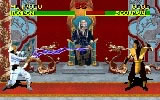
While the law did not discuss the violence in home video games, such a law is the stepping stone for much more stringent ordinances. The AAMA (American Amusement Machine Association) filed suit with the distributor and operators of these machines, and on October 19, 2000 received the words they wanted to hear. At least for the mean time the Courts were in the video game makers favor.
Supporters of that bill still fight the ruling in appeal, but it's far from the worse onslaught the industry has ever had to face. In fact, it's hard to believe, but this debate really isn't anything new, and frankly, most of the people arguing against it don't even know what games are being played these days. Just a few weeks ago a Senator Joseph Leiberman was on TV explaining that games like "Doom" and "Mortal Kombat" are tainting our society.
Well, perhaps Mr. Leiberman would be happy to know that Doom hasn't sold a unit in five years, and nobody seems to care about Mortal Kombat.
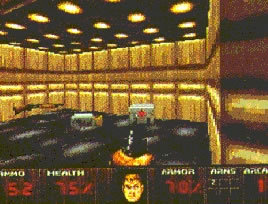
Even Doom has taken a step back. No longer are you fighting out of Hell, now it's all multiplayer death matches. But the dark violent side to first person shooters has been lost somewhere along the way. And even the military was using these "simulators" as training, so any complaints against the genre would be unfounded.
But even though video game violence seems to be on an all time low, you can't help but notice the amount of States, lawyers, and politicians discussing this issue. You'd think that the world was being over taken by such violence. And it's not going away any time soon, either. Just remember, 2002 is an election year, and with three next generation systems competing the government should have a lot to work with.
HOME |
CONTACT |
NOW HIRING |
WHAT IS DEFUNCT GAMES? |
NINTENDO SWITCH ONLINE |
RETRO-BIT PUBLISHING
Retro-Bit |
Switch Planet |
The Halcyon Show |
Same Name, Different Game |
Dragnix |
Press the Buttons
Game Zone Online | Hardcore Gamer | The Dreamcast Junkyard | Video Game Blogger
Dr Strife | Games For Lunch | Mondo Cool Cast | Boxed Pixels | Sega CD Universe | Gaming Trend
Game Zone Online | Hardcore Gamer | The Dreamcast Junkyard | Video Game Blogger
Dr Strife | Games For Lunch | Mondo Cool Cast | Boxed Pixels | Sega CD Universe | Gaming Trend
Copyright © 2001-2025 Defunct Games
All rights reserved. All trademarks are properties of their respective owners.
All rights reserved. All trademarks are properties of their respective owners.













